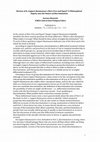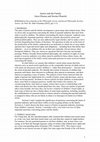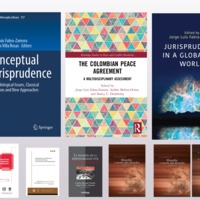Papers by Serena Olsaretti

This paper’s material forms the basis for a chapter on “Beyond the Public Goods Argument: Fairnes... more This paper’s material forms the basis for a chapter on “Beyond the Public Goods Argument: Fairness and Social Necessary Labour”, for a manuscript titled Parental Justice, under contract with Oxford University Press. It is the product of research undertaken for the project on Justice and the Family. An Analysis of the Normative Significance of Procreation and Parenthood in a Just Society, sponsored by an ERC Consolidator Grant (Grant number: 648610; Project Acronym: Family Justice).In academic and public debates, defenders of the case for sharing the costs of children (“socialisation”, for short) have often claimed that by having and rearing children parents produce public goods for the rest of society, or perform socially valuable, indeed necessary, labour, and that it would be unfair to parents to not share the costs of children for this reason. Whether a version of this argument (which I loosely refer to as the “public goods argument”) can be defended depends, among other things, on whether there is a defensible normative principle that can vindicate this charge of unfairness: why exactly is it unfair, to producers of public goods or those who willingly engage in socially valuable activities, not to share in the costs of production of those goods? And can this unfairness charge be made about parents? Critics of the public goods argument have claimed that it fails because there is no independently defensible principle that can serve to buttress the claims of parents. This paper examines the possibility of enlisting the ideal of equality of resources defended by Ronald Dworkin to provide the normative underpinning of a version of the public goods argument. Although Dworkin himself does not address the question of how the costs of children should be shared in a just society, and although his view has been taken to be inhospitable to the case for socialisation, I claim that equality of resources can, in fact, provide the bases for that case. In order to argue for this conclusion, the paper does two main things. First, it offers an interpretation of the theory of equality of resources that avoids what I view as certain misconceptions regarding some aspects of that theory. Most importantly, I suggest that the role, in equality of resources, of both people’s identification with their lifeplans or ambitions, and that of the so-called envy test, are more circumscribed than we might think, and that, by contrast, the role of the idea of true opportunity costs as the metric of equality is more central than has generally been noticed. Second, I suggest that, in order to make the case for socialisation, we should focus on a part of the ideal of equality of resources that is generally under-discussed – the view’s treatment of what I call productive fairness. Once we keep these points in mind, I claim, equality of resources, contrary to received wisdom, turns out to be hospitable, not inimical, to one important argument for socialisation.This project has received funding from the European Research Council (ERC) under the European Union’s Horizon 2020 Research and Innovation programme (Grant Agreement Number: 648610)

Erkenntnis
In academic and public debates, defenders of the case for sharing the costs of children often cla... more In academic and public debates, defenders of the case for sharing the costs of children often claim that by having and rearing children parents produce public goods for the rest of society, or perform socially valuable or necessary labour, and that it would be unfair to parents for others to not share the costs of children, for example through publicly funded parental leave and schools for this reason. Critics of the public goods argument have claimed that it fails because there is no defensible principle that can serve to buttress the claims of parents. Furthermore, these same critics, as well as others, have argued that a certain view of liberal equality militates against sharing the costs of children.This paper challenges both the contention that there is no defensible principle of fairness that can buttress the public goods argument and the contention that liberal equality militates against socialisation. It accomplishes these two tasks together, arguing that the ideal of equali...

Law, ethics and philosophy, Mar 17, 2023
According to Valeria Ottonelli and Tiziana Torresi, liberal states owe prospective low-skilled mi... more According to Valeria Ottonelli and Tiziana Torresi, liberal states owe prospective low-skilled migrants a temporary migration package, that is, a distinctive package of rights and regulations, different from permanent residency and from citizenship, which protects them from vulnerability while accommodating their temporary migration projects. Liberal states owe this package to prospective migrants not merely as a remedial but as an inherently justified option, by dint of their commitment to a principle of accommodation. This paper raises a challenge for the claim that a liberal principle of accommodation tells in favor of the temporary migration package as a non-remedial option for low-skilled temporary migrants. It does so by claiming that Ottonelli and Torresi need to specify with precision what are the fundamental interests that call for the accommodation of temporary migration projects, and by distinguishing between a noninstrumental and an instrumental view of the value of the temporary migration package for those fundamental interests. The paper then argues that neither of these views supports a non-remedial case for the temporary migration package for the low-skilled. The low-skilled may be owed the temporary migration package, but only as a remedial option; a nonremedial case for the temporary migration package may be defensible, but not for the low-skilled. This challenge holds, the paper claims, even if we accept that people often voluntarily embark on temporary migration projects. A more promising principle for buttressing the non-remedial case for the temporary migration package for the low-skilled, the paper concludes, may be that of liberal neutrality.
Philosophy & Public Affairs, Sep 1, 2022

Analysis, Sep 4, 2015
At the outset of Born Free and Equal?, Kasper Lippert-Rasmussen helpfully identifies the three ce... more At the outset of Born Free and Equal?, Kasper Lippert-Rasmussen helpfully identifies the three central questions his book addresses: "What is discrimination?; What makes it wrong?; What should be done about wrongful discrimination?" (3). To each of these questions Lippert-Rasmussen dedicates one of the three parts into which the book is divided. According to Lippert-Rasmussen, discrimination is differential treatment (which includes acts, policies, and practices) on the basis of real or imputed membership in socially salient groups (i.e., groups perceived membership of which structures interaction in many social contexts), which either shows a biased attitude towards those discriminated against (as in the case of direct discrimination), or which does or would result in the discriminatees' being made worse off relative to others (as with some instances of direct discrimination, and as with indirect discrimination). Although there are other types of differential treatment, including some which are wrongful, Lippert-Rasmussen justifies focusing on group discrimination as defined above on the dual grounds that this is what is often at stake in debates on discrimination, and that group discrimination is a reliable proxy for wrongful differential treatment (33). Choosing to focus on group discrimination for these reasons may be defensible, although at times Lippert-Rasmussen's claim seems to be the conceptual claim that only group discrimination qualifies as discrimination at all (e.g. at 33 and at 95). Lippert-Rasmussen also makes other conceptual claims, such as the one, which he takes as a fixed point in two argumentative moves (at 23 and 25), that nepotism does not constitute discrimination. His definition of discrimination also excludes the possibility of what we might call Neroism-i.e., differential treatment that tracks only the discriminator's capricious moods-from qualifying as discrimination. What justifies these restrictions remains unclear. These definitional issues raise a more general doubt about the aims of Part 1 of the book. In Part 1, Lippert-Rasmussen wants to identify "which nonmoral properties discrimination has" (14); he also wants to remain neutral between different accounts of why discrimination is wrong, examination of which he defers until Part 2. Given these two aims, it seems that he should use a very inclusive concept of discrimination (that allows nepotism, Neroism, and discrimination of people from non-socially salient groups to qualify as discrimination) so as not to bias the discussion of when and why differential treatment constitutes discrimination in the morally relevant sense in favour or against any particular account. On Lippert-Rasmussen's view, defended in Part 2, discrimination is wrong, when it is, because it disadvantages those who are worse off than others while not being less deserving than others. This desert-prioritarian view is a particular, consequentialist, version of the harm-based account, on which discrimination is
Review of the book "Bottlenecks: a new theory of equal opportunity" by Joseph Fishkin.T... more Review of the book "Bottlenecks: a new theory of equal opportunity" by Joseph Fishkin.This book review was reposted on June 9, 2021 to acknowledge that this project received funding from the European Research Council (ERC) under the European Union’s Horizon 2020 Research and Innovation programme (Grant Agreement Number: 648610;Grant Acronym:Family Justice)
This is longer, English-language version of an interview published in the Catalan magazine Valors... more This is longer, English-language version of an interview published in the Catalan magazine Valors in December 2019; questions by Maria Coll. For the Catalan version, see https://valors.org/tema/serena-olsaretti

Serena Olsaretti, 2022
The topic of justice and the family encompasses a great many inter-related issues. Here we focus ... more The topic of justice and the family encompasses a great many inter-related issues. Here we focus only on questions concerning the limits to parental authority that stem from what is owed to children. The debates surrounding the limits of parents’ authority raise philosophically important questions which are currently discussed by moral and political philosophers.They are also addressed by legal scholars, and we make a move towards integrating these bodies of literature. We assume that children’s moral status means that their interests carry as much moral significance as the comparable interests of adults and we will centre our discussion on how children’s – rather than third parties’ – interests limit the remit of parental authority. We identify three kinds of interests of children that generate such limits: their interests in wellbeing, their interest in autonomy, and their interest in acquiring a sense of justice. The paper proceeds as follows. Sections 2 and 3 explain the significance of questions concerning the limits of parental authority and locate them within several on-going debates on the family. Sections 4, 5 and 6 discuss the three sources of limits on parental authority stemming from children’s interests. Section 7 concludes with a very brief overview of other important questions concerning justice and the family.
Serena Olsaretti, 2022
This paper defends an argument for sharing the costs of children-the socialized goods argument-fr... more This paper defends an argument for sharing the costs of children-the socialized goods argument-from Sabine Hohl's recent critique of it. According to Hohl, the socialized goods argument rests on a principle of fair play that is implausible, as it commits us to condemning all redistributive taxation. Furthermore, Hohl claims, it need not be true that non-parents benefit from parents in the relevant sense for non-parents to acquire obligations of fair play to share the costs of parents. The paper argues that neither objection is fatal, but that engaging with them is helpful in clarifying what the normative significance is, exactly, of the fact that the benefits of children are deliberately socialized rather than public goods; and in bringing to view the importance of what baseline is assumed when we claim that some activities are beneficial to others.
The Oxford Handbook of Population Ethics
Theorists of egalitarian justice generally assume that the principles they formulate apply to a g... more Theorists of egalitarian justice generally assume that the principles they formulate apply to a group of individuals whose creation and size is taken as given. Yet many of the policies egalitarians favor distribute the costs and benefits of children in different ways, and, by so doing, affect people’s procreative choices and a society’s population size. How do considerations of egalitarian justice bear on how the costs and benefits of children should be distributed and on what the population size should be in a just society? This chapter argues for the importance of addressing these questions within an egalitarian theory of justice and critically examines one revisionary way of answering them.
Introduction Serena Olsaretti 1. Desire formation and human good Richard Arneson 2. Preference fo... more Introduction Serena Olsaretti 1. Desire formation and human good Richard Arneson 2. Preference formation and personal good Connie S. Rosati 3. Leading a life of one's own: on well-being and narrative autonomy Johan Brannmark 4. Well-being, adaptation and human limitations Mozaffar Qizilbash 5. Consequentialism and preference formation in economics and game theory Daniel M. Hausman 6. Preferences, deliberation and satisfaction Philip Pettit 7. Content-related and attitude-related reasons for preferences Christian Piller 8. Reasoning with preferences? John Broome 9. Taking unconsidered preferences seriously Robert Sugden 10. Preferences, paternalism and liberty Cass R. Sustein and Richard H. Thaler 11. Preference change and interpersonal comparisons of welfare Alex Voorhoeve.
This chapter introduces the idea of distributive justice. It identifies several different views o... more This chapter introduces the idea of distributive justice. It identifies several different views of what characterizes distributive justice, as opposed to other types of justice and to nonjustice-based moral demands. The preconditions of distributive justice, its primary sub ject and its object, and its normative significance are discussed. The chapter then sug gests that bringing the diversity of usages of the concept of distributive justice into view helps cast light on some of the many contemporary debates about distributive justice and its limits. This chapter also introduces and outlines the different topics covered by the dif ferent sections and chapters of the book.
Work for this article has received funding from the European Research Council (ERC) under the Eur... more Work for this article has received funding from the European Research Council (ERC) under the European Union’s Horizon 2020 Research and Innovation Programme (Grant Agreement Number: 648610; Grant Acronym: Family Justice).

Oxford Scholarship Online, 2017
The justification of the parent-child relationship that lies at the core of the family raises two... more The justification of the parent-child relationship that lies at the core of the family raises two main challenges for liberal egalitarianism: the challenge of authority and the challenge of partiality. These point, respectively, to the burdens of justifying to children their parents’ having rights over them, and to third parties parents’ favoring of their children in ways that negatively affects others. This paper examines some recent attempts at justifying the family and meeting these two challenges by appealing to the non-instrumental value of the parent-child relationship. It argues that these accounts do not capture some important convictions about the moral status of the parent-child relationship and thereby do not fully meet the two stated challenges. The paper also offers an alternative basis for justifying the parent-child relationship on which parents, by virtue of being morally responsible for their children’s existence, have an obligation to enter a relationship with them.

Oxford Handbooks Online, 2016
Claims of voluntariness and the converse notion of force are invoked as the bases for conclusions... more Claims of voluntariness and the converse notion of force are invoked as the bases for conclusions about people’s rights and responsibilities in a wide range of contexts. Yet the notion of voluntariness has received less direct attention than have the related notions of freedom, coercion, autonomy, and self-ownership. The aim of this chapter is to bring to light and assess the distinctive role and normative significance of voluntariness for our judgments about people’s rights and obligations. In particular, the chapter addresses two main questions about the relevance of voluntariness. The first is whether voluntariness itself, or only the absence of coercion, has normative significance. The second is whether the notion of self-ownership must be defined through voluntariness, and what implications this has for the theses that political philosophers make by appealing to the importance of self-ownership.

Jurisprudence, 2014
In The Idea of Justice1 Amartya Sen revisits many of the topics to which he has contributed durin... more In The Idea of Justice1 Amartya Sen revisits many of the topics to which he has contributed during his rich 60-year-long career, mainly those topics that lie at the intersection between philosophy and economics and that are connected, as this book’s title suggests, to Sen’s interest in justice. The usefulness of social choice theory, the limitations of utilitarianism, the power and bounds of reason and rationality, the role of freedom in human lives and of public reason in politics: these are some of the recurrent themes of The Idea of Justice. The book brings them together with the aim of making a case for a practically relevant way of studying justice—one on which, as John Gray has put it, we ‘do not need an ideal of a perfectly just society, only a view about what would make the world a more just place’.2 Central to Sen’s idea of what would make the world a more just place is the need to ensure for people substantive freedoms or, in Sen’s language, capabilities to obtain valuable things. Sen’s ‘capability approach’ is arguably his most distinctive contribution to contemporary discussions about justice and is the subject of four of the 18 chapters of The Idea of Justice, namely those that make up ‘The Materials of Justice’ (Part III of the book). In what follows, I identify the central claims Sen makes in this part of the book. I then raise a set of questions regarding his renewed case for the importance of taking capabilities or substantive freedoms, rather than people’s achieved functionings, as the relevant standard for assessing people’s just claims.











Uploads
Papers by Serena Olsaretti